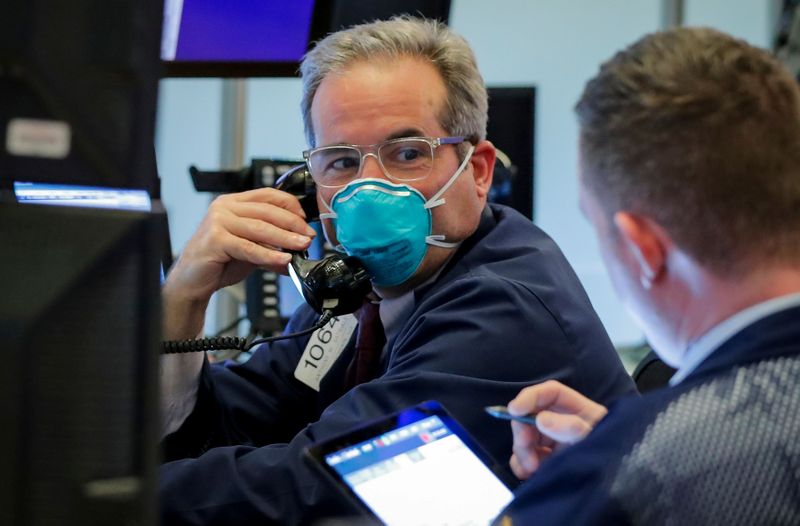By Uday Sampath Kumar and Medha Singh
(Reuters) - The Dow Jones tumbled more than 700 points on Wednesday as investors fled to safe-haven assets after new orders for U.S.-made goods plunged to an 11-year low and private payrolls fell for the first time since 2017.
The blue-chip Dow and the S&P 500 ended Tuesday with their worst opening quarters in history as efforts to contain the virus resulted in deserted shopping streets, massive staff furloughs and a halt in business activity.
Meanwhile, the collapse in oil prices brought about its first major casualty with Whiting Petroleum (N:WLL) filing for Chapter 11 bankruptcy protection. Its shares slumped 42%.
"There is no easy way to quantify either the economic shutdown or what the eventual recovery is going to look like as the monetary and fiscal policy initiatives are as historic as the economic decline," said Art Hogan, chief market strategist at National Securities in New York.
Companies on the benchmark index have lost more than $5.6 trillion in market value so far this year, despite trillions of dollars in fiscal and monetary stimulus that helped equity markets claw back some of the sharp declines last week.
On Tuesday, U.S. President Donald Trump warned Americans of a "painful" two weeks ahead, with White House health officials modeling an enormous jump in virus-related deaths even with strict social distancing measures.
U.S. real estate <.SPLRCR>, utilties (SPLRCU) and consumer staples (SPLRCS) stocks, which had held up so far as they are considered stable during times of extreme volatility, fell between 1% and 6.7%.
Goldman Sachs (NYSE:GS) now expects sequential real U.S. GDP to plummet 34% in the second quarter on an annualized basis, foreshadowing a deep economic slump.
"Talk of a bottom in equity markets still seems remarkably premature given the continued increase in infection and death rates across Europe and the United States," said Michael Hewson, chief market analyst at CMC Markets in London.
With the quarterly reporting season set to begin in two weeks, S&P 500 companies are expected to enter an earnings recession in 2020, falling 3.7% in the first quarter and 9.6% in the second.
At 9:56 a.m. ET the Dow Jones Industrial Average (DJI) was down 658.21 points, or 3.00%, at 21,258.95, the S&P 500 (SPX) was down 82.63 points, or 3.20%, at 2,501.96 and the Nasdaq Composite (IXIC) was down 213.20 points, or 2.77%, at 7,486.90.
Interest-rate sensitive stocks on the banking index <.SPXBK> fell 5%, while airlines, hotels and cruise operators shed between 5% and 7%.
The energy sector (SPNY) shed another 3%, with experts now saying oil prices could touch single digits, exacerbated by a share tussle among top producers as the world runs out of storage space.
Declining issues outnumbered advancers more than 13-to-1 on the NYSE and 6-to-1 on the Nasdaq.

The S&P index recorded no new 52-week high and seven new lows, while the Nasdaq recorded four new highs and 32 new lows.